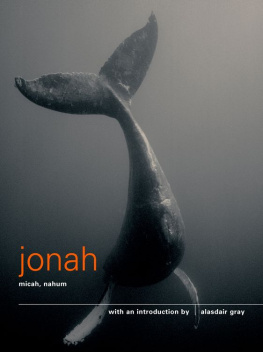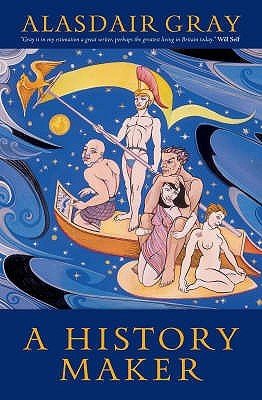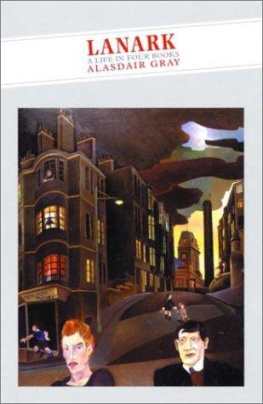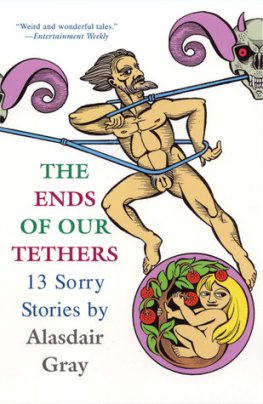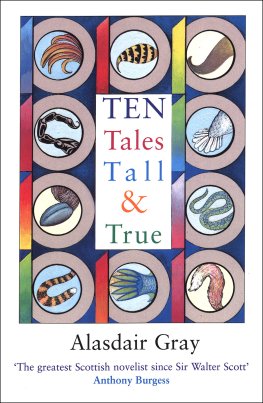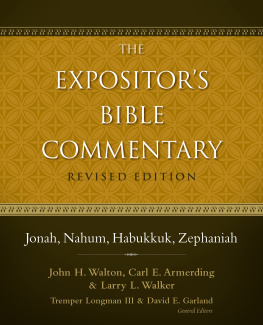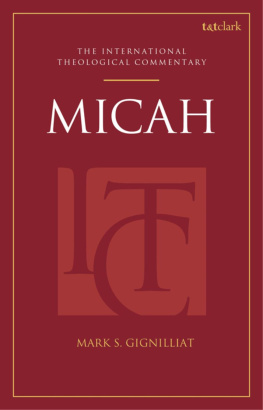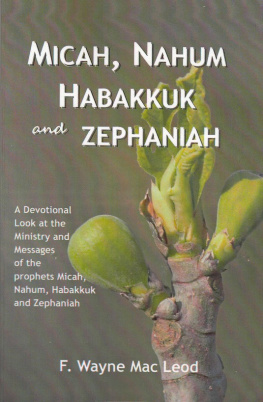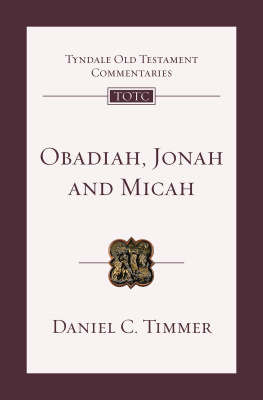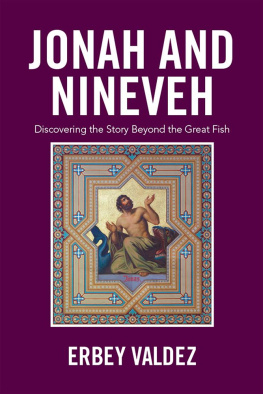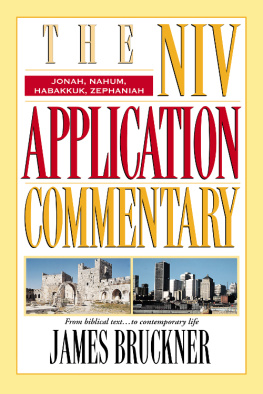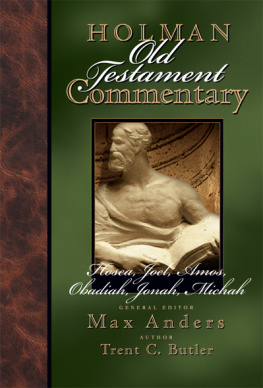Alasdair Gray - The Books of Jonah, Micah and Nahum
Here you can read online Alasdair Gray - The Books of Jonah, Micah and Nahum full text of the book (entire story) in english for free. Download pdf and epub, get meaning, cover and reviews about this ebook. year: 1999, publisher: Canongate Books, genre: Science. Description of the work, (preface) as well as reviews are available. Best literature library LitArk.com created for fans of good reading and offers a wide selection of genres:
Romance novel
Science fiction
Adventure
Detective
Science
History
Home and family
Prose
Art
Politics
Computer
Non-fiction
Religion
Business
Children
Humor
Choose a favorite category and find really read worthwhile books. Enjoy immersion in the world of imagination, feel the emotions of the characters or learn something new for yourself, make an fascinating discovery.
- Book:The Books of Jonah, Micah and Nahum
- Author:
- Publisher:Canongate Books
- Genre:
- Year:1999
- Rating:4 / 5
- Favourites:Add to favourites
- Your mark:
- 80
- 1
- 2
- 3
- 4
- 5
The Books of Jonah, Micah and Nahum: summary, description and annotation
We offer to read an annotation, description, summary or preface (depends on what the author of the book "The Books of Jonah, Micah and Nahum" wrote himself). If you haven't found the necessary information about the book — write in the comments, we will try to find it.
This text presents the books of Jonah, Micah and Nahum. The book of Jonah shows the people of Nineveh being forgiven, yet this overturns usual biblical narrative such as Micah and Nahum where Israels enemies are expected to get their come-uppance. With an introduction by Alasdair Gray.
The Books of Jonah, Micah and Nahum — read online for free the complete book (whole text) full work
Below is the text of the book, divided by pages. System saving the place of the last page read, allows you to conveniently read the book "The Books of Jonah, Micah and Nahum" online for free, without having to search again every time where you left off. Put a bookmark, and you can go to the page where you finished reading at any time.
Font size:
Interval:
Bookmark:
His books are the novels Lanark, 1982 Janine, The Fall of Kelvin Walker, Something Leather, McGrotty and Ludmilla, Poor Things, A History Maker; shortstory collections Unlikely Stories Mostly, Lean Tales (withAgnes Owens and James Kelman), Ten Tales Tall & True, Mavis Belfrage; poetry Old Negatives; polemic Why Scots Should Rule Scotland 1992, Why Scots should Rule Scotland 1997; play Working Legs (for people without them); autobiography Saltire Self Portrait 4; literary history The Anthology of Prefaces. His hobbies are socialism and liking the English. The thirty-nine books called The Old Testament in the King James Bible show the state of the Jews between 900 and 100 BC and preserve legends from more ancient times. They were edited into their present form by scholars defending their culture from an empire ruling the place where they lived: an empire of people equally clever and literate: Greeks whose books were as various as their gods. Jews were then unique in worshipping a single God: their folklore, laws, politics and poetry kept mentioning him. The editors arranged these books in the chronological order of the subject matter, producing a story of their people from prehistoric times and making their God the strongest character in world fiction. It began with a second-century BC poem telling how he made the universe and people like a poet, out of words, followed by a fifth-century BC tale of how he made man like a potter, out of clay.
It then showed God adapting to his worshippers from prehistoric times to their own. Adam, Cain and Noah find God punitive but soothed by the smell of burnt flesh, mostly animal. He connives with the tricks of Abraham and Isaac, polygamous nomads who get cattle or revenge by prostituting a wife or cheating foreigners and relatives. When Moses leads Jewish tribes out of Egypt God commands them like a Pharaoh, promising unlimited protection for unlimited obedience. He is a war god when they invade Palestine, smiting them with plague when they do not kill every man, woman, child and animal in a captured city. Their leaders (called prophets because God tells them the future) are fathers of tribal families and military commanders until they get land and cities of their own where (as 92, Whin other lands) wealth is managed by official landlords and priests who exploit the poor.
New kinds of prophet then arise: poets inspired by moral rage who speak for the exploited. They say that if Jewish rulers dont obey God by being just and merciful he will use the might of foreigners to smash their new-made kingdoms. That happens. From 680 BC to 1948 Jews are ruled by foreign empires, first Assyrian and at last British. They outlive so many empires that Norwegian Ibsen calls them the aristocrats of world history, for they can survive without a land and government. That was not wholly true.
They were governed by the words of their prophets, especially those in the last OldTestament books who said the Jewish God is also God of all people, even people who oppress them; that God has created Jews to keep his words alive until the whole world learns justice and mercy by obeying him; that before then Jews should welcome suffering as punishment for sin or tests of faith. After the first destruction of Jerusalem in 586 BC this must have sounded a new policy to those who wanted to repossess a national territory gained (as all nations have gained territory) by killing folk. No wonder many Jews assimilated with foreigners and the faithful sometimes sang psalms begging God to leave them alone. The book of Jonah is a prose comedy about a Jew who wants God to leave him alone and cannot grasp that Gods policy is now for those of every nation. Jonah is an unwilling prophet. His Jewish conscience orders him to denounce the wicked Assyrian empire in its capital city so he at once sails towards a different city where he hopes foreign gods will prevail over his own.
This breaks the first of the ten commandments: You shall have no otherGod than me (Deuteronomy 5): hence the tempest. The international crew see it is aimed at someone aboard. Many verses describe their reluctance to fling Jonah out, even when he tells them it is the one way to save themselves. The book is insisting that mercy is not just a Jewish virtue; but out Jonah goes and God saves him in the belly of a fish. Here the prophet chants a psalm saying God can save those who cry unto him from the belly of hell. This hell is not the eternal torture chamber later adopted by official Christianity.
For Jews hell is the worst that living people can suffer and Jonah IS suffering it, unless the fish intestines are a cosy place. But now he knows that God is always with him and he need not fear death. Then comes a parody of Exodus, Chapter 11, perhaps the cruellest book in the Old Testament. In it the God of Moses sends Pharaoh a message then hardens Pharaohs heart to reject it, giving Moses an excuse to condemn all Egyptian first-born children and cattle to death by plague. But God uses Jonah to send the Assyrians a message that softens their kings heart. The king leads his people into abandoning their evil ways, so God repented of the evil that he had said that hewould do unto them; and he did it not (Jonah 3:10).
This contradicts the Mosaic code, which says evil MUST be rewarded with evil. So Jonah learns he is not a scourge in the hand of God, like Moses, Joshua and Samson, but a reformer, and like many reformers he now looks stupid. It is obvious that the enemy king who thought his people might be persuaded to deserve mercy knew more about God than Gods Hebrew prophet. Jonahs short but influential career ends not with a bang but with his dismal whimper: I knew that thou art a gracious God, and merciful, Therefore now, O Lord, take, I beseechthee, my life from me, for it is better for me to die than to live (Jonah 4:23). God cuts this self-pitying cackle with a short question: Doest thou well to be angry? (Jonah 4:4) Jonah is too cowardly or childish to admit anger and squats outside the city determined to die by sunstroke if the promise of destruction is not fulfilled. Not even the mercy of miraculous shade cast over him softens this determination.
The shade is withdrawn. In a fever Jonah hears God repeat something like his last question. He now answers truthfully and is favoured by words framed like another question. They suggest reasons for both Gods action and his inaction: most evil is caused by folly; widespread slaughter is not the best cure if a warning of disaster helps folk to change their ways. We are not told if Jonah learns these lessons because they are meant for us. Believers and unbelievers have argued pointlessly about the truth of Jonahs book because they did not know great truths can be told in fantasies.
It was known by editors who put Jonah
Font size:
Interval:
Bookmark:
Similar books «The Books of Jonah, Micah and Nahum»
Look at similar books to The Books of Jonah, Micah and Nahum. We have selected literature similar in name and meaning in the hope of providing readers with more options to find new, interesting, not yet read works.
Discussion, reviews of the book The Books of Jonah, Micah and Nahum and just readers' own opinions. Leave your comments, write what you think about the work, its meaning or the main characters. Specify what exactly you liked and what you didn't like, and why you think so.

